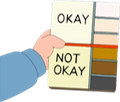this post was submitted on 30 Aug 2023
40 points (100.0% liked)
askchapo
23063 readers
229 users here now
Ask Hexbear is the place to ask and answer ~~thought-provoking~~ questions.
Rules:
-
Posts must ask a question.
-
If the question asked is serious, answer seriously.
-
Questions where you want to learn more about socialism are allowed, but questions in bad faith are not.
-
Try !feedback@hexbear.net if you're having questions about regarding moderation, site policy, the site itself, development, volunteering or the mod team.
founded 5 years ago
MODERATORS
you are viewing a single comment's thread
view the rest of the comments
view the rest of the comments



fuck them.
I need a clip to figure out if my dialect does this or not
voiced th is in "that" - you vibrate your throat. Unvoiced th is in "tooth" - you just blow and dont use your throat at all.
I pronounce those th's the same. I honestly don't understand what you're talking about.
The unvoiced one sounds like compressed air, a hissing kind of noise like 'sssssss' but with the tounge touching the bottom of the top teeth.
The voiced one has a throat vibration like when you say 'errrrrr', simultaneously with the unvoiced mouth position.
i've been hearing it all over youtube lately, dunno if it is new or if i only just noticed it
What would the opposite of a voiced th be?
the one in "thin", "thought", etc.
Appreciated! why wouldn't one pronounce th in thank then?
not what i mean. they pronounce it, just differently. pronouncing it with voiced th (https://en.wikipedia.org/wiki/Voiced_dental_fricative) instead of voiceless th (https://en.wikipedia.org/wiki/Voiceless_dental_fricative)
Oh okay, thanks for the explanation
what?
Spelling mistake, fixed it.
Hank